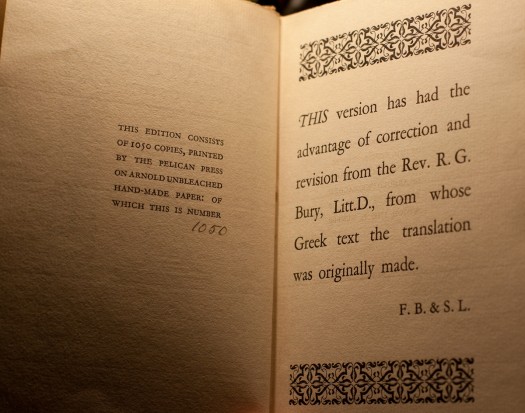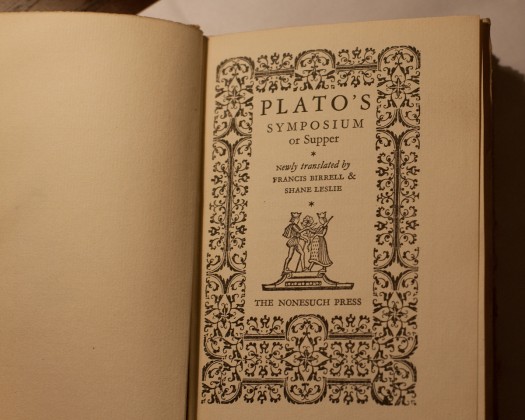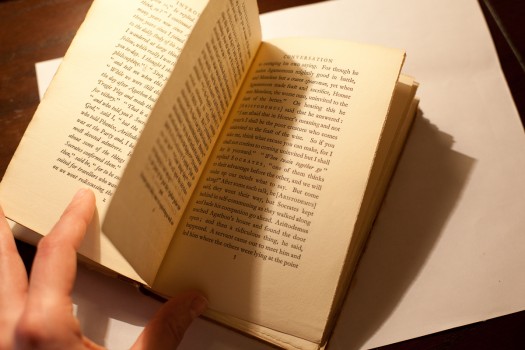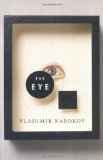My thousandth book: Fate deems it so
March 23, 2010
I’ve been shopping at Powell’s City of Books for my entire life, and as such, maintain a complicated, sometimes fretful relationship with the enormous bookstore not unlike relationships I might carry on with a human, full of bluster and happy times and occasionally anger. In the way of a blunted, old friendship, sometimes I take for granted the gems that still can be found.
Take Saturday, when I made the trip I make about once per season to drop a hundred dollars on the kind of books you have to get in person. I can buy trade paperbacks and Penguin classics online. But for certain book-tasks, like finding the right Loeb Classical edition of Diogenes Laertius or comparing translations of Virgil, bookstores are where it’s at, and though I sometimes protest along the lines of Powell’s being too obvious, too what-you-do-with-people-when-they-visit-Portland, it was actually my idea to go, and usually is; I asked Aubrey, our visiting friend this weekend, to go with me. Hell. I like Powell’s. It could even be said that I love it.
My goal was to find a good edition of Plato’s Republic, but I was in, oh, what you might call the Plato section; this being Powell’s, reputed to be the largest bookstore in the free world, you could probably build an inhabitable structure out of their selection of Platonic texts. Tucked into the rows somewhere, which, by dint of the astronomical number of volumes Powell’s holds and the rather unassuming dun brown color of the spine, was an adorable copy of Plato’s Symposium or Supper from the Nonesuch Press, from 1924.
It caught my eye. The title page had a quaint, almost primitive letterpress feel, and the pages were uneven and clearly of handmade paper. On the reverse side of the title page, this:

From a limited run of 1050 copies, this was copy 1050. Had it been copy 583 or copy 872, I might have been able to resist the $35 diversion. But as it was, such a handsome piece simultaneously dainty and purposeful, I had to have it.
I’m glad I bought it. I’m already deeply attached to its rarity and history: Nonesuch press was founded by Francis Meynell, British designer, his wife Vera Mendel, and David Garnett. They used a little letterpress to design their books and then mass-printed them on bigger, commercial presses. I’ve been trying to track down some of the other copies of this book. It looks like Cambridge might have one (they have a considerable “Meynell collection”), a state library in Australia looks to have one, and there are a few available on the online used book market. It’s not worth that much; it’s just intriguing. By all signs it appears to be set in Caslon, which endears me to it even more.

Besides the huggable Caslon, the little book abounds in fleurons and beautiful ligatures, lovely small caps running heads and a fantastic italic. It uses typographical design to help make sense of the Symposium’s fourth- or fifth-party narrative—it really is egregiously complex in structure.

By chance, it is also my one-thousandth book. My statistics in LibraryThing looked like this:

One Comment
Recently Reviewed
Get the Books
Read my Reviews
Related Posts
- Reader Question: Where to start with Plato?
January 16, 2010 - A Piece of (Local) History
March 21, 2009 - Tuesday Thingers: Favorite Bookstores
August 12, 2008 - Letterpress: Caslon has Arrived! And Leading!
September 2, 2008 - Book Review: "The Elements of Typographic Style" by Robert Bringhurst
September 8, 2008




Fascinating that this is the 1000th book – I have not even begun to enter all of my books in LT, but one day, one day I will.